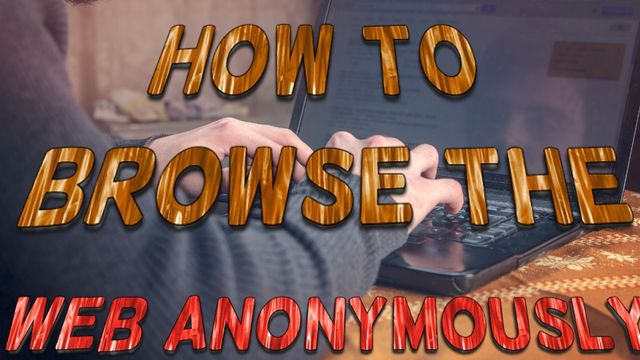How to Browse the Web Anonymously

This article describes many methods how to browse the web anonymously? and ways to stay as anonymous as possible. To make it happen, you don’t have to fundamentally alter how you use the internet.
How to Browse the Web Anonymously
Ways to Browse the Web Anonymously
It’s nearly impossible to remain completely anonymous online. When you browse the web normally, the owner of the website, your ISP, the government, and anybody else with access to the system can see your information. Fortunately, there are a few privacy strategies you may take to browse the web a little more covertly.
To become the best anonymous browser, adhere to following actions, listed in order of ease of use and privacy strength:
- Use a web proxy to conceal your IP address. Although not all proxies are created equal, there are a number of free ones that are excellent for viewing the internet secretly, like Hidester.
- When you use a proxy to visit a website, all of the traffic is diverted through a distant server before the page is transferred to your device.
- This implies that your browsing seems to be coming from that server’s location rather than your actual location to anyone who may be observing (the website you’re on, your ISP, the authorities, etc.).
- Link up using a VPN. Similar to a web proxy, a VPN is beneficial when you want all traffic to be encrypted and routed through multiple servers rather than just one.
- A VPN keeps all of your file sharing, messaging, and other activities anonymous.
- When selecting a safe VPN, it’s critical to consider whether they maintain logs of your visits and search history.
- If they do, there is a possibility that they will reveal such information if required to do so by a law enforcement official or that your private information will be exposed if a hacker obtains it.
You are just as anonymous as you choose to be with a VPN. For instance, even if you accomplished anything while using a VPN, sending emails from your primary email address or uploading something to your public social media accounts will still reveal your identify.
- Use a browser that respects your privacy. Tor Browser is one illustration of an anonymous browser that conceals your web browsing history.
- Tor Browser encrypts the traffic and distributes it around numerous servers.
- Use a secure search engine to browse the web, such as DuckDuckGo or Start page, which guarantee to keep your search history secret and block advertising trackers.
- Other search engines might reveal your search history to government authorities, share it with third parties so they can target you with adverts, or reveal it to the websites you’re on so they know what you were looking for to get there.
- Avoid using free WiFi in public places like hotels and restaurants. It’s unknown who is watching the traffic from the opposite side of the building or what is going on with the security and privacy procedures at that company.
- In a similar vein, avoid connecting to a Wi-Fi network unless it employs a cutting-edge encryption technique like WPA2. Make sure the network is encrypted if you want to remain anonymous when using Wi-Fi.
- To stop your web browser from remembering the websites you visited, go to private mode. When finished, simply exit the programme to stop any history or passwords from being saved.
- Cookies are important for storing login information so that a website can give you access to your online account. However, other websites might be able to access them to expose who you are and what you’ve been doing online.
Other Ways to Stay Anonymous Online
Only one aspect of the online world is web browsing. You must think about how to maintain your anonymity when using email, a web-based texting service, file-sharing websites, etc.
- Use a disposable email account, an anonymous email service, or a secure email provider like ProtonMail.
- You should expect zero-knowledge encryption from the cloud storage provider you utilize.
- When shopping online, avoid using your actual credit card information and choose virtual cards from a company like Privacy or Blur instead.
- To prevent your personal information from being included to the profile, log in to a website using an account sharing service like BugMeNot.
- Use private social networking sites only.
- Avoid using instant messaging apps that don’t support end-to-end encryption; Signal and WhatsApp are both solid options.
- To trick apps and websites that use location monitoring, set up your phone with a false GPS location.
- Remove your personal information off the internet so that no one may use it to find out your address, phone number, family, or other details.
- Use a website like Text’em to send texts secretly.
- Change the DNS servers you’re using; choose a provider like the Fourth Estate that won’t record DNS requests.
- Use an app that provides you with a second number that is unrelated to your real name to place calls.
Why Browse Anonymously?
Everyone’s response might be unique, but for the majority of individuals, privacy is the key.
Being more aware of your internet presence can assist minimize what your employer can find out about you if you’re looking for a new job and would prefer they weren’t aware of it. Or maybe you’re looking for information about prescription drugs and you don’t want the website to track you or get your real email; if it’s not your “true” account that you check daily, spamming your email isn’t as valuable to them.
- What is Web Scraping
- How to Block All Websites Except One (Few)
- How to block websites on Android
- How to Block a Website on Windows 10
Conclusion
Additionally, anonymous web browsing can be advantageous if you reside in a nation with restrictive web regulations. You can avoid access restrictions by hiding your browsing behaviour.
If nothing else, you might just want to feel secure in the knowledge that your online activities aren’t being monitored and recorded for marketing purposes.
People May Ask
Q- A free proxy website: what is it?
A- Online proxy service Hide.me is safe and free. Online, virtually any kind of website can be seen without charge. You can unblock banned websites using the proxy. For simple access to the proxy, you can also use an extension for Chrome or Firefox.
Q- Is using a proxy forbidden?
A- By definition, it is acceptable to use proxies to access online content from countries other than the United States. In truth, proxies have long been used to shield networks and internet users from hackers, malicious software, and other shady activity.
Q- VPN tracking by the government?
A- Police can’t monitor live, encrypted VPN traffic, but they can ask your ISP (Internet Service Provider) for connection or usage logs if they obtain a court order. due to your ISP the cops to them if they know you’re using a VPN.
Q- Why is using a VPN legal?
A- Using a VPN in any way that is even remotely associated with terrorism or other criminal activity is punished because those actions are prohibited by law. That might entail copyrighted content downloading and reselling, unauthorized computer or network hacking, and cyberstalking.
Q- Where is VPN forbidden?
A- China, Russia, Belarus, North Korea, Turkmenistan, Uganda, Iraq, Turkey, United Arab Emirates, and Oman are the ten nations that have outlawed VPNs.






